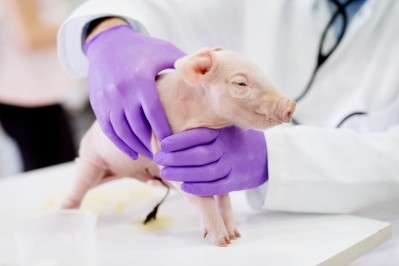Study: Mannanase, multi-enzyme supplementation improves feed efficiency in pigs

However, they also saw the use of mannanase and multi-enzyme complexes did improve both growth and feed efficiency at that life-stage.
The findings, published in Animal Feed Science and Technology, were drawn from a systematic review and meta-analysis that the animal scientists carried out.
They wanted to see which exogenous enzymes with which diet type most consistently improve pig growth, nutrient digestibility and feed efficiency. They used a dataset of 39 comparisons from 67 peer-reviewed publications.
“The response to enzyme supplementation is influenced by the main cereal source used in the diet formulation. Dietary supplementation with mannanase increased feed efficiency with maize-based diets and dietary supplementation with multi-enzyme complexes improved feed efficiency when maize-, wheat-, barley- and co-product-based diets were fed to grow-finisher pigs,” concluded the researchers.
As feed represents around 72% of the total cost of producing pigs (Teagasc, 2016) and pigs are unable to utilize all dietary components, strategies to improve feed efficiency are of particular interest as a means of increasing environmental as well as economic sustainability (Aarnink and Verstegen, 2007; Clark and Tilman, 2017), said the team.
Dietary supplementation of pig diets with exogenous enzymes has been suggested as one such strategy. However, the team noted that inconsistent results are found in the literature.
Xylanase + β-glucanase supplementation
Lead author, Peadar Lawlor, who is a research officer based at Teagasc’s Pig Development Department, in Moorepark, Cork, Ireland, told FeedNavigator that of particular interest was their observation that xylanase or xylanase + β-glucanase supplementation did not appear to improve feed efficiency in grow-finisher pigs despite their fairly widespread use in wheat and barley based diets.
“At Moorepark, we have recently supplemented xylanase + β-glucanase to barley-wheat-soybean diets in a number of trials with grow-finisher pigs and, in some trials, we found improvements in FCE of 0.10 FCE units, however, other times we did not find any response to the enzyme.”
Lawlor found the consistency in response to mannanase supplementation surprising, while he said the consistent benefit arising from the multi-enzyme complexes was interesting.
"There is not a lot of work published on protease yet, but this also looks promising. We have also found this to be the case in experiments conducted here in Moorepark in recent years where improvements in FCE were found in response to protease supplementation. This is certainly an enzyme to watch.”
This meta-analysis only accessed published work, he stressed.
“One thing that might be important in all of this is that companies sponsoring work on their enzymes do not always publish work on their enzymes when results are not good,” cautioned Lawlor.
Source: Animal Feed Science and Technology
Published online ahead of print: https://doi.org/10.1016/j.anifeedsci.2018.12.007
Title: Systematic review and meta-analysis of the effect of feed enzymes on growth and nutrient digestibility in grow-finisher pigs: Effect of enzyme type and cereal source
Authors: A Torres-Pitarch, E G Manzanilla, G E Gardiner, J V O’Doherty, P G Lawlor
Another recent review that Lawlor et al was also involved evaluated the effect of feed enzymes on digestibility and growth in weaned pigs.
In the past, they said, in-feed antibiotics and pharmacological levels of zinc oxide and copper were supplemented to starter diets to help overcome the post-weaning ‘growth check’; however, concern regarding antimicrobial resistance and environmental impact have led to a reduction in the use of antibiotics, a decrease in the copper levels allowed and a pending EU-wide ban on the use of zinc oxide in piglet diets; so alternative strategies must be developed.
Alternatives such as prebiotics (O'Sullivan et al., 2010), probiotics (Valeriano et al., 2017), organic acids (Suiryanrayna and Ramana, 2015) and essential oils (Zeng et al., 2015b), as well as exogenous enzymes have all been suggested as having potential to improve post-weaning feed intake and growth. Feeding exogenous enzymes could aid digestion of the complex matrix of non-milk-based ingredients present in the piglet’s post-weaning diet and could bridge the gap until the pig’s endogenous enzyme secretory capacity for α-amylase, proteases and lipases has had time to develop, said the team.
The scientists, in their meta-analysis, found supplementation with exogenous phytase showed the most consistent improvements in piglet growth, phosphorous digestibility, and bone mineralization.
They also observed that protease supplementation increased feed intake. Nutrient digestibility was increased mainly when multi-enzyme complexes containing protease and/or mannanase were included. Carbohydrases improved nutrient digestibility when supplemented as part of a complex; however, growth responses were not consistent, said the authors.
There is a need for more experiments to determine the response to protease and mannanase when supplemented alone, and factors such as particle size, nutrient density of the diet and feed form can influence the response to enzyme supplementation in post-weaning diets, added the researchers.
Source: Animal Feed Science and Technology

















